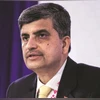There is no significant downside risk to 6.5-7 per cent GDP growth projected by the Economic Survey and other than food prices, inflation is not a challenge, Economic Affairs Secretary Ajay Seth said here on Wednesday.
“Several informed people have been talking about an apparent slowdown. Yes, the numbers in the second quarter do show some of the products and services may not be at the same level they were about a year ago or two quarters earlier. However, e-way bills and e-invoices for October do not indicate there is any significant possibility of any downside risk of 6.5-7 per cent growth,” Seth said. He was participating in a secretary panel discussion at the curtain-raiser event of Ficci’s Annual General Meeting (AGM).
On inflation, Seth said food prices have been a problem area. “That has been because of continuing and unusually long rainfall this year. But other than the food prices, inflation is not a challenge,” he added.
However, Seth refused to comment on the possibility of interest rate cut by the Reserve Bank of India (RBI). “That is a monetary policy action. With full information, the central bank will take a view on that,” he said.
Seth said there may be some undershooting in capex in the current financial year (FY25), but he doesn’t expect it to be significant. “While some sectors are a bit slow, there is additional demand from a few other sectors. I don’t see it (undershooting) as a major issue. Last year, capex was around 95 per cent of the budgeted target. Even this year, we will be around the same percentage,” he said.
Defence Secretary Rajesh Kumar Singh said there is a strong strategic case for going indigenous and the government intends to double down on that. “The value of production has gone up three times in the last 10 years or so. Exports have gone up 31 times. Our focus increasingly has been on ensuring that we spend our capex within this country. Three years ago, we had set up the ratio at 60 per cent to be spent within India. The ratio for the current financial year has been set at 75 per cent,” Singh said.
More From This Section
Steel Secretary Sandeep Poundrik agreed with the industry’s concern that steel dumping is happening at the international level in the last few months and steel prices have come down. However, Poundrik said the problem with hiking basic customs duty to protect the industry is that 62 per cent of our imports are from countries with which India has free trade agreements (FTAs) with zero duty. “However, it is under examination because some of the major imports are not covered under FTAs,” he said.
On US President-elect Donald Trump’s tariff threats, S Krishnan, secretary, Ministry of Electronics & Information Technology (Meity), said there could be an opportunity for India and the country needs to prepare to take as much advantage as it can. “Of course, some of the tariffs could be against products from India. But I don’t think we will be the primary target,” he added.
Seth said more than policy of the Trump administration, how the two ongoing wars unfold and what happens to the Chinese economy need to be watched carefully. “China has a huge manufacturing capacity and if the demand is not increasing to the extent it has been in the past, there would be challenges for all countries, including India,” Seth said.
Textiles Secretary Rachna Shah said since textiles and garments is a labour-intensive sector, she sees a lot of absorption of workforce, especially women, to happen. “We want India to be a recycling and circular textile manufacturing hub. There is also a huge opportunity for mainstreaming and integrating traditional textiles such as handlooms with the industry in a bigger way. The Indian industry can play a critical role in that,” she added.
)